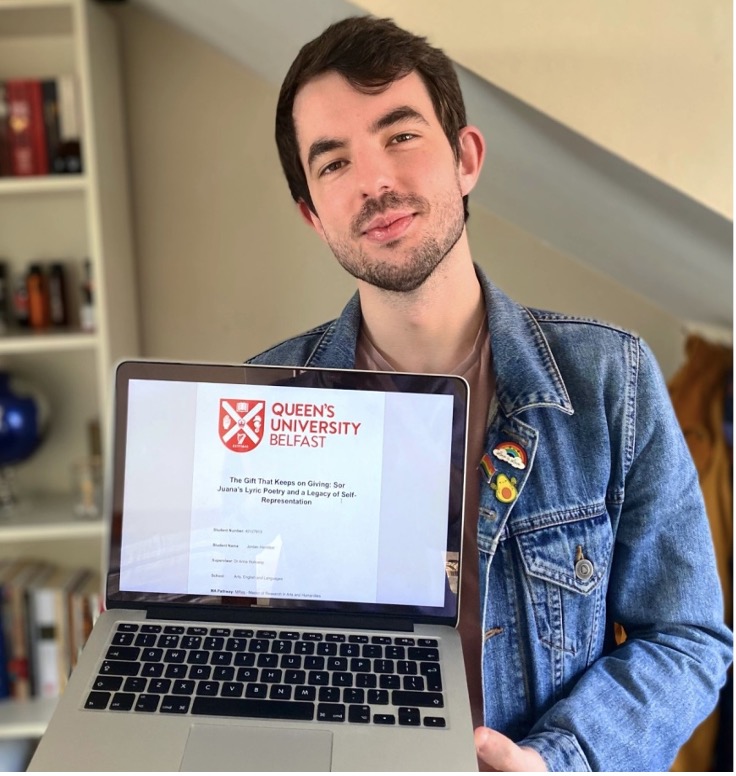This post is part of our Research Initiation Scheme for 2020-2021.
Jordan Hamilton began his higher education trajectory with a BA Hons degree in English and Spanish at Queen’s University Belfast. Looking ahead to potential postgraduate study, Jordan decided to pursue his interests in Golden Age Spanish literature. Subsequently, he applied to do the MRes in Arts and Humanities. Jordan went on to successfully complete the MRes on a part-time basis under the supervision of Dr Anne Holloway.
In the following interview, Jordan reflects on his research project and methodologies. He also offers advice for undergraduate students who are considering following a similar academic pathway.

The key focus of Jordan’s MRes project was the New Spanish poet and Hieronymite nun Sor Juana Inés de la Cruz (1648-1695). His interest in this figure was sparked during the third year cultural cursillo (mini-module) on ‘Foreign Correspondents’, when he was allocated her love poetry as the theme for his class presentation. It was precisely the preparatory research that Jordan carried out for this presentation, which inspired his interest in Sor Juana’s poem Romance 51. This newfound passion served as the catalyst for his MRes proposal. Initially, his proposal included Sor Juana’s Renaissance love poetry and her self-representation.
Jordan was particularly interested in the love poetry that Sor Juana addressed to other women. Therefore, he opted to examine her poetic works through a queer lens. Jordan’s initial proposal evolved to also include Sor Juana’s reception; drawing comparisons between the ways in which her work was received in her contemporary moment (late 17th century Mexico) and in the 21st century. A tendency has emerged in 21st century popular culture to read Sor Juana’s love poems to her female patrons as open expressions of same-sex desire. However, Jordan’s thesis suggests that critics (and film makers) could run the risk of exaggerating queer ideologies, and may fail to acknowledge the highly performative and rhetorical mode of interaction amongst the people of Sor Juana’s context. Thus, Jordan strived to offer a tempered version of these hyperbolic viewpoints in his research project.
Jordan outlines his principal research methodologies to have included: textual analysis and an exploration of the lyric theory of the Hispanic Baroque period. He also used adaption and reception studies. Given that Sor Juana was writing towards the end of the Baroque period, Jordan affirms that it was important for him to research the broader historical context in order to fully appreciate the trajectory.
Jordan considers the ever-evolving nature of research and the way in which it organically leads to unexpected places to have been the most exciting part of his MRes project. Often these diversions brought about key moments of clarity and helped to inform the over-arching objectives of his proposal.
In terms of advice for students considering postgraduate study, Jordan emphasizes the importance of transparency, honesty and communication with the MRes tutors. He also stresses the value of thorough preparation in advance of tutor meetings. Jordan insists that self-belief and confidence are vital. He acknowledges that the dissertation word count can initially seem daunting. Nevertheless, he assures me that the Spanish department at Queen’s is an extremely supportive environment. Speaking from experience, he asserts that the tutors not only want to be of genuine assistance, but that they also want students to be proud of the work they produce.
Interview by Jane McCutcheon, final-year undergraduate in English and Spanish